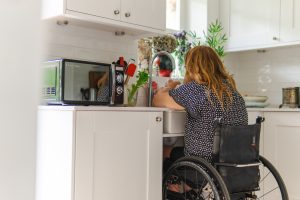Personal aids and home adaptations are modifications to your home or equipment designed to support independent living – whether for yourself or someone you care for. These tools can greatly improve safety and mobility and aim to help people stay in their own homes for longer and with more confidence.
Aids and adaptations can range from small pieces of equipment to substantial structural changes to your home, all aimed at improving the quality of life for you or the person you care for. They can address specific challenges or be tailored to particular rooms where support is most needed.
Examples of personal aids might include
- Mobility aids: such as wheelchairs or walkers
- Communication aids: such as sign language tools or hearing aids
- Assistive technology: such as adaptive keyboards or voice-activated devices
- Everyday living aids: such as bath seats or commodes
Examples of home adaptations might include
- Structural changes: such as widened doorways or ramps
- Bathroom adaptations: such as grab rails or walk in showers
- Stair adaptations: such as stair lifts or handrails
- Home adaptations: such as alarms or key safes
If you or the person you care for are experiencing difficulties at home, the first step may be to request a needs assessment from Adult Social Care. This assessment evaluates the current situation and care needs. As a carer, you can also request a carers assessment to explore what help you might need in your caring role.
A carers assessment can be done separately or can be combined with a needs assessment, which is a conversation with the person you care for about any help they might need, for example services such as home care or payments to pay towards additional support.
Based on the assessment, a care and support plan will be developed, which may include:
- Recommendations for care or equipment.
- Suggestions for minor or major home adaptations.
- Referrals to relevant services or local organisations.
An occupational therapist may also be involved to provide specialised advice and recommendations on suitable aids and adaptations.
Alternatively, if you would like an occupational therapy assessment separate from a needs assessment, this can also be done by contacting Leeds Adult Social Care. Their number is 0113 222 4401.
Some equipment or minor adaptations costing under a certain amount may be provided free of charge by Leeds City Council or by the NHS, depending on the assessment outcome.
For larger or more complex adaptations, a financial assessment will determine available funding and any required personal contributions.
Based on your financial circumstances, Leeds City Council may cover the full cost, request a partial contribution or offer alternative support or advice.
Disability Facilities Grant
If significant home adaptations are identified as necessary following your assessment (e.g. ramps or walk in showers), you may be eligible for a Disabled Facilities Grant, but this is not always guaranteed and there could be a long wait.
This means-tested grant from Leeds City Council assists disabled individuals in making essential home modifications based on eligibility criteria.
An occupational therapist or social worker can assist with the application process. For more information, visit the Leeds City Council website.
